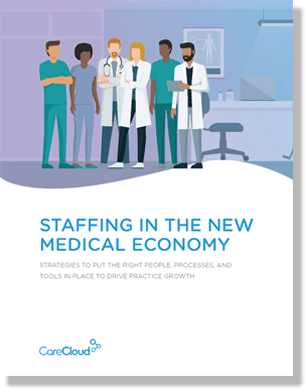How huge is healthcare?
The United States spends over 17% of its GDP on it, so it’s no surprise it’s an evergreen topic in the national conversation. It’s also changing rather quickly – if you think patients engaging with their personal health data is a groundbreaking move now, imagine when health IT’s artificial intelligence capabilities move beyond just rule-based intelligence.
Cloud-based technology is revolutionizing the way physicians practice, and its applications in other industries indicate its potential in dealing with the administrative and budgetary challenges the healthcare industry presents.
So why are doctors still reluctant to switch over?
Reluctance Despite Incentives
To encourage use of more advanced and connected technologies, the government instituted incentives to organizations that adopt and “meaningfully use” EHR technology. Organizations that meet the Meaningful Use criteria for Medicare and Medicaid healthcare management are given monetary rewards for their efforts.
Yet, according to a CDW Cloud Computing Tracking Poll, just 30 percent of medical practices have transitioned to cloud computing services. This reluctance to embrace remotely hosted solutions and SaaS is, in part, because of a misguided belief that records kept in-house are more private and secure. Unfortunately, reports of data breaches as a result of physical theft are becoming more common. According to the 2012 Data Breach Investigations Report conducted by Verizon, seven percent of all data breaches occur in the healthcare industry. And, as healthcare organizations are discovering, the cost of non-compliance can be high.
One such breach occurred involving a large national insurance provider. As the article states, “57 computer hard drives were stolen from a locked data network closet in a leased office facility. The drives contained the unencrypted protected health information of more than one million individuals, including names, Social Security numbers, diagnosis codes, dates of birth, and health plan identification numbers.” This incident resulted in a settlement of USD1.5 million with the U.S. Department of Health and Human Services.
As this example shows, and others like it, in-house systems are not necessarily more secure, compliant or private than systems and services provided by cloud computing.
Benefits of Outsourcing EHR to the Cloud
Key to the successful transition to SaaS and cloud services is choosing vendors that have expertise in healthcare cloud computing, a proven
record of security and compliance, and rely
on advanced technologies and architectures.
With the optimal combination of vendors and technology solutions, medical practices can benefit in the following three main areas.
Security, compliance, and privacy
Healthcare cloud services and hosting companies must meet the security and compliance requirements of ICD-10 and ANSI 5010. Cloud-based healthcare software solutions offered by companies, such as industry leader CareCloud, are not only 100 percent HIPAA compliant, they protect electronic data against unauthorized retrieval with 256-bit SSL file encryption, which is more stringent than government mandates.
In addition, advanced hosting services that use hardware-assisted security platforms (like the one described later in the Business Case) help protect data from possible breaches of protected health information. Cloud-based systems also improve secure access and sharing of protected data through health information exchanges that connect medical practices and governing medical bodies, such as federal and state governments, insurance companies, and ACOs. These are assurances not easily matched by in-house IT systems.
Cost efficiency and improved focus
Even large healthcare organizations have a difficult time matching the cost-effectiveness of massively scaled cloud providers and solutions without heavy and continuous investment in hardware, software, and personnel. In addition, most healthcare cloud-computing vendors offer 24-hour service and IT management, something few, if any, in-house IT systems
can provide. Cloud-computing vendors also support the technology and services that satisfy Meaningful Use incentives.
As regulations and compliance become more onerous for healthcare organizations, turning to cloud-computing SaaS not only makes budget sense, it can also improve core business performance. By outsourcing EHR, medical practices can focus on maintaining patient care and growing their businesses rather than on maintaining IT expertise.
Flexibility and scalability
As medical practices grow, practice management software and hardware must adapt, too. But finding in-house IT solutions that can quickly scale is not easy. Healthcare cloud computing services, on the other hand, are robust, flexible, and scalable, providing support for medical practices at all stages of business growth.
And as organizations grow, so does the need for data and reporting that help make informed business decisions. Often, in-house software has pre-programmed reports that may not provide the level of detail needed by a multi-practice organization. With cloud computing and SaaS, most EHR services can be phased in as needed and data easily accessed across clinical practices within a facility to offer robust reporting capabilities.
Thanks for reading the second installment in our “Cloud Computing and the Health IT Crisis” series.
The material and information contained on this website is for general information purposes only. You should not solely rely upon the material or information on the website as a basis for making any business, legal, medical, or any other decisions. While we endeavor to keep all information up-to-date and correct, all information in this site is provided "as is," and CareCloud Corporation and MTBC Inc. make no representations or warranties of any kind, express or implied, about the completeness, accuracy, reliability, suitability, or availability with respect to the information contained on the website for any purpose. Any reliance you place on such material is therefore strictly at your own risk.



